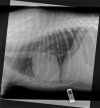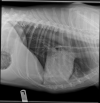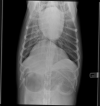Was looking at the Vet, Dr. Karen Becker's
site for respiratory support, and it is not specifically mentioned in her Shop by Health Issue menu - was thinking perhaps NAC would be helpful. Here is one comment, albeit a human study on a Pet Health
products page:
N-acetylcysteine (NAC) is a derivative of the naturally occurring amino acid, cysteine. NAC has an extensive history of use as a mucolytic (breaks down mucous) in the treatment of acute and chronic lung conditions such as emphysema, bronchitis, chronic asthma, and cystic fibrosis. It directly splits the sulfur linkages of mucoproteins thereby reducing viscosity of bronchial and lung secretions. As a result it improves bronchial and lung function, reduces cough, and improves oxygen saturation in the blood.
In detailed analysis of 39 human trials it has been concluded that oral NAC reduces the risk of exacerbations (severe worsening) and improves symptoms in patients with chronic bronchitis compared with a placebo.
In addition to its benefits to respiratory health, NAC is serves as a nutritional precursor for the synthesis of glutathione, which is a powerful antioxidant. Glutathione also detoxifies chemicals into less harmful compounds. N-Acetyl Cysteine has also been shown to be effective in treating liver failure and detoxifying heavy metals from the body.
Is there a better alternative (elderly female 12 who has had past experience with pneumonia (had been on Cefasteptin at the time, which may have saved her), and she has periods of heavy breathing - congested phlegmy sounding at times). She sleeps well, quietens down, and seems to struggle at other times breathing-wise; up and down. She is getting laser therapy primarily for her spine/back legs - and has improved recently, and somewhat significantly with her stability. She is on supplements from her other holistic Vet (liver support and Three Seeds). She has a long-term thyroid issue and receives 0.3 mg of Synthroid twice a day (was not comfortable with this and yet the blood work did not change the fact).
Her diet was raw food for much of her life until the pnemonia, and upon advice from the holistic vet we modified it to cooking for her (meat with an aim on Chinese hot/cold aspects), and then reintroduced her back to raw food, for a while, yet she was having trouble with it and again switched her off it for a modified no grain diet (and cooking). She likes grass at times, which produces the usual associated issues, however her stools are generally consistent and she is urinating well without problem.
Near three weeks ago (when away) my partner called me in distress and had consulted a local Vet (they have her history), and it appeared that she was failing quickly and a decision was made to help her on her way. Her younger doggie buddies were no less knowing of her failing as was evident when I got back - it sure looked like her time. So stayed with her and eventually nudged her outside, which she responded to. She started resting and by the morning she was improved; eating, drinking and she had regained stability and spark - still under some distress; breathing and stability. It is possible she had had a mini stroke, and this can happen, and it may have happened before this relapse. Currently, she still wants to be here and is doing a mighty fine job of convincing; walking with the other dogs sometimes (attempts to run), excitement, and always happy to greet us. Appetite is smooth. So it is a monitoring phase and readjustment phase, if possible.
Thanks for any suggestions.




